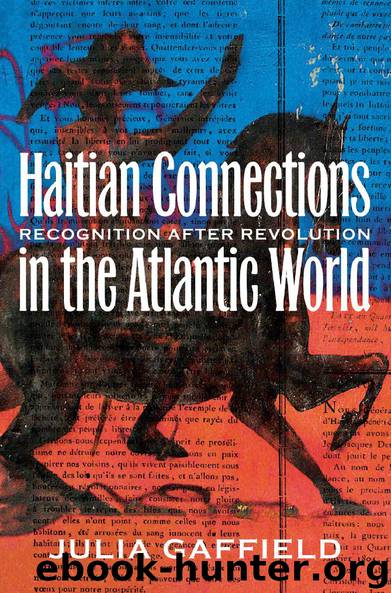Haitian Connections in the Atlantic World: Recognition After Revolution by Julia Gaffield

Author:Julia Gaffield [Gaffield, Julia]
Language: eng
Format: epub
Tags: History, Caribbean & West Indies, General, Political Science, History & Theory, International Relations, Diplomacy
ISBN: 9781469625621
Google: b51WrgEACAAJ
Amazon: 1469625628
Goodreads: 26543341
Publisher: University of North Carolina Press
Published: 2015-09-26T04:00:00+00:00
Armed Merchant Vessels
Haiti’s ambiguous status continued to pose problems both within the United States and between U.S. officials and French representatives in the country. American merchants continued to visit Haiti, but their voyages became risky because of the rampant privateering that the French and Spanish focused on this trade after the Declaration of Independence. Furthermore, as they had been in Curaçao and St. Thomas, French officials were relentless in their efforts to convince the U.S. government to prohibit the trade. The initial problem-solving efforts in the U.S. government focused on the “unofficial war” being waged in the Caribbean. The issue was the fact that American merchants were arming their vessels like warships. The arming of merchant vessels was “common practice,” but the specificity of the trade relationship involving a rebel colony of former slaves and the nature of the goods exported to Haiti (war matérial) meant that southern slaveholders opposed the practice.36 Governor Nugent in Jamaica encountered similar opposition in Jamaica, but he remained convinced that a friendly relationship with Haiti would prevent the spread of the revolution. The U.S. government, however, could not act on this concern immediately since there was no law forbidding the arming of merchant vessels. The French would have to wait until Congress could pass such a law.37
At the beginning of the 8th session of Congress, on 8 November 1804, President Thomas Jefferson made it clear to the members of Congress that they had to take action in order to stop the unofficial war in the Caribbean. He noted an increase in illicit behavior on the high seas by foreign ships, including unacceptable actions by American merchants. “While noticing the irregularities on the ocean by others,” he stated, “those on our own part should not be omitted, nor left unprovided for. Complaints have been received that persons, residing within the United States, have taken on themselves to arm merchant vessels, and to force a commerce into certain ports and countries, in defiance of the laws of those countries.” This statement implies that Jefferson still recognized French control over Haiti since he assumed that French law applied to the island. “That individuals should undertake to wage private war, independently of the authority of their country,” he concluded, “cannot be permitted in a well ordered society.”
Just four days after this address, the House of Representatives created a committee to find a solution to the problem of Haiti’s status, especially the legality of trade with the new country. On 23 November 1804, the committee read a proposed bill for the first and second times; the bill did not actually prohibit merchants from arming themselves or from trading with Haiti. Rather, the bill simply stipulated that the owners of armed vessels would have to post bond with two sufficient sureties in the sum of double the value of the vessel on the condition “that such vessel shall not make or commit any depredation, outrage, unlawful assault, or violence, against the vessels, citizens, subjects, or territory of any nation in amity with the United States.
Download
This site does not store any files on its server. We only index and link to content provided by other sites. Please contact the content providers to delete copyright contents if any and email us, we'll remove relevant links or contents immediately.
| Arms Control | Diplomacy |
| Security | Trades & Tariffs |
| Treaties | African |
| Asian | Australian & Oceanian |
| Canadian | Caribbean & Latin American |
| European | Middle Eastern |
| Russian & Former Soviet Union |
The Secret History by Donna Tartt(19092)
The Social Justice Warrior Handbook by Lisa De Pasquale(12191)
Thirteen Reasons Why by Jay Asher(8912)
This Is How You Lose Her by Junot Diaz(6889)
Weapons of Math Destruction by Cathy O'Neil(6281)
Zero to One by Peter Thiel(5802)
Beartown by Fredrik Backman(5756)
The Myth of the Strong Leader by Archie Brown(5509)
The Fire Next Time by James Baldwin(5448)
How Democracies Die by Steven Levitsky & Daniel Ziblatt(5219)
Promise Me, Dad by Joe Biden(5154)
Stone's Rules by Roger Stone(5088)
A Higher Loyalty: Truth, Lies, and Leadership by James Comey(4964)
100 Deadly Skills by Clint Emerson(4927)
Rise and Kill First by Ronen Bergman(4790)
Secrecy World by Jake Bernstein(4753)
The David Icke Guide to the Global Conspiracy (and how to end it) by David Icke(4720)
The Farm by Tom Rob Smith(4514)
The Doomsday Machine by Daniel Ellsberg(4490)
